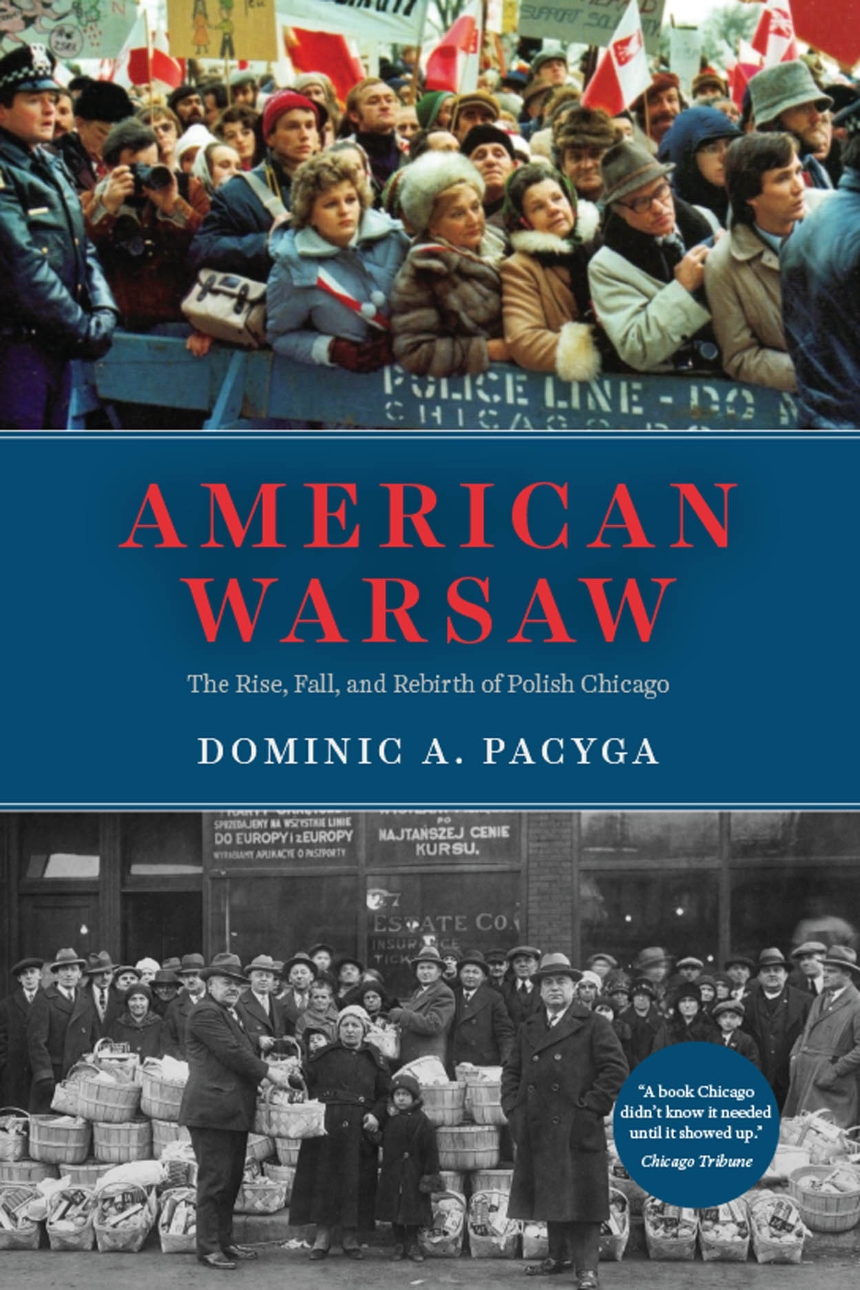American Warsaw
The Rise, Fall, and Rebirth of Polish Chicago
9780226815343
9780226406619
9780226406756
American Warsaw
The Rise, Fall, and Rebirth of Polish Chicago
A comprehensive and engaging history of a century of Polish immigration and influence in Chicago.
Every May, a sea of 250,000 people decked out in red and white head to Chicago’s Loop to celebrate the Polish Constitution Day Parade. In the city, you can tune in to not one but four different Polish-language radio stations or jam out to the Polkaholics. You can have lunch at pierogi food trucks or pick up pączkis at the grocery store. And if you’re lucky, you get to take off work for Casimir Pulaski Day. For more than a century, Chicago has been home to one of the largest Polish populations outside of Poland, and the group has had an enormous influence on the city’s culture and politics. Yet, until now, there has not been a comprehensive history of the Chicago Polonia.
With American Warsaw, award-winning historian and Polish American Dominic A. Pacyga chronicles more than a century of immigration, and later emigration back to Poland, showing how the community has continually redefined what it means to be Polish in Chicago. He takes us from the Civil War era until today, focusing on how three major waves of immigrants, refugees, and fortune seekers shaped and then redefined the Polonia. Pacyga also traces the movement of Polish immigrants from the peasantry to the middle class and from urban working-class districts dominated by major industries to suburbia. He documents Polish Chicago’s alignments and divisions: with other Chicago ethnic groups; with the Catholic Church; with unions, politicians, and city hall; and even among its own members. And he explores the ever-shifting sense of Polskość, or “Polishness.”
Today Chicago is slowly being eclipsed by other Polish immigrant centers, but it remains a vibrant—and sometimes contentious—heart of the Polish American experience. American Warsaw is a sweeping story that expertly depicts a people who are deeply connected to their historical home and, at the same time, fiercely proud of their adopted city. As Pacyga writes, “While we were Americans, we also considered ourselves to be Poles. In that strange Chicago ethnic way, there was no real difference between the two.”
Every May, a sea of 250,000 people decked out in red and white head to Chicago’s Loop to celebrate the Polish Constitution Day Parade. In the city, you can tune in to not one but four different Polish-language radio stations or jam out to the Polkaholics. You can have lunch at pierogi food trucks or pick up pączkis at the grocery store. And if you’re lucky, you get to take off work for Casimir Pulaski Day. For more than a century, Chicago has been home to one of the largest Polish populations outside of Poland, and the group has had an enormous influence on the city’s culture and politics. Yet, until now, there has not been a comprehensive history of the Chicago Polonia.
With American Warsaw, award-winning historian and Polish American Dominic A. Pacyga chronicles more than a century of immigration, and later emigration back to Poland, showing how the community has continually redefined what it means to be Polish in Chicago. He takes us from the Civil War era until today, focusing on how three major waves of immigrants, refugees, and fortune seekers shaped and then redefined the Polonia. Pacyga also traces the movement of Polish immigrants from the peasantry to the middle class and from urban working-class districts dominated by major industries to suburbia. He documents Polish Chicago’s alignments and divisions: with other Chicago ethnic groups; with the Catholic Church; with unions, politicians, and city hall; and even among its own members. And he explores the ever-shifting sense of Polskość, or “Polishness.”
Today Chicago is slowly being eclipsed by other Polish immigrant centers, but it remains a vibrant—and sometimes contentious—heart of the Polish American experience. American Warsaw is a sweeping story that expertly depicts a people who are deeply connected to their historical home and, at the same time, fiercely proud of their adopted city. As Pacyga writes, “While we were Americans, we also considered ourselves to be Poles. In that strange Chicago ethnic way, there was no real difference between the two.”
296 pages | 44 halftones | 6 x 9 | © 2019
History: American History, Urban History
Political Science: Urban Politics
Sociology: Race, Ethnic, and Minority Relations
Reviews
Table of Contents
Introduction: Polish Chicago
1 Meet Me at the Fair: Poland’s Fourth Partition
2 Settling In: Creating Polonia’s Capital
3 Living in Polish Chicago, 1880–1920
4 World War One: A Turning Point
5 Interwar Polonia: Years of Stress and Change
6 Apocalypse Again: World War Two and Its Aftermath
7 The Lost Struggle: Chicago’s Polonia, Communist Poland, and a Changing City
8 A New Polonia
1 Meet Me at the Fair: Poland’s Fourth Partition
2 Settling In: Creating Polonia’s Capital
3 Living in Polish Chicago, 1880–1920
4 World War One: A Turning Point
5 Interwar Polonia: Years of Stress and Change
6 Apocalypse Again: World War Two and Its Aftermath
7 The Lost Struggle: Chicago’s Polonia, Communist Poland, and a Changing City
8 A New Polonia
Acknowledgments
Notes
Index
Notes
Index
Awards
Illinois State Historical Society: Award for Superior Achievement
Won
Polish American Historical Association: Oskar Halecki Prize
Won
